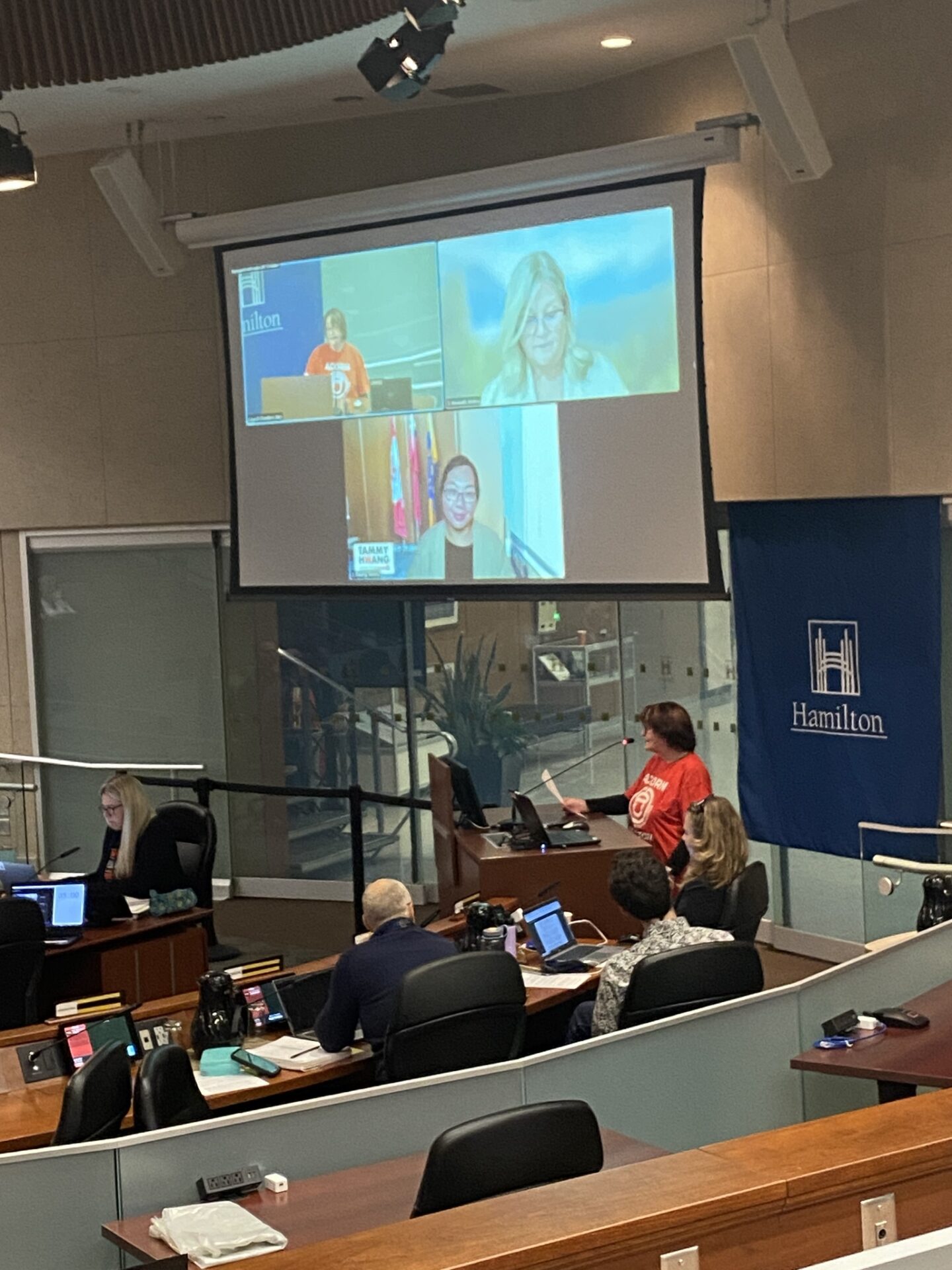The Hamilton Spectator: Housing, policing top of mind for Hamilton residents ahead of budget talks
Posted January 17, 2024
Delegates call for redirected policing dollars, renter protections, taxes kept in check
Housing, policing and affordability are among the big-ticket items residents have told city councillors to tackle as they head into 2024 budget talks.
Dozens took the chance to offer their two cents on the city’s proposed $2-billion spending plan on Tuesday at city hall, despite concerns the hefty series of documents had only been released publicly the Friday before.
Nearly 50 delegates signed up to speak in person or virtually, with several urging city politicians to reject a $13-million hike for police operations, back up a new series of tenant-protection measures with funding and roll out more affordable transit.
Some speakers also told council to keep taxes in check with a 7.9 per cent hike projected at the outset of deliberations.
“We respectfully suggest that this council needs to differentiate between what we ‘need to have’ to function as a city and what we would ‘like to have,’” said Mary Aduckiewicz, CEO of Denninger’s.
Meanwhile, an alliance of community groups called the Just Recovery Coalition suggested the value of services that taxation brings to residents shouldn’t get lost in the discussion.
“These dollars, these public dollars, that are going to services, benefit our community in ways that we cannot even measure,” Ian Borsuk, executive director of Environment Hamilton, said during a news conference ahead of the afternoon budget feedback session.
That potential 7.9 per cent increase is down from a 14.2 per cent spike finance staff offered as an estimate this past fall but still more than last year’s 5.8 per cent rise. The proposed 2024 increase works out to $382 for an “average residential home” assessed at $385,000, according to the last provincial valuation in 2016.
Following a directive from Mayor Andrea Horwath, staff say they’ve drafted a plan that dips deeper into reserves and relies more heavily on debt financing in an effort to keep taxes lower while maintaining services and pursuing council priorities.
They have also underscored that 2.6 per cent of the overall hike can be attributed to provincial legislation, including Bill 23, which reduces how much development charge revenue the city can generate to pay for growth-related infrastructure.
In the chambers Tuesday, councillors seated around the horseshoe, with brand-new city manager Marnie Cluckie among senior staff on the front bench, listened as delegates took aim at the police’s proposed $13-million operating hike.
Those dollars should instead be put toward priorities such as affordable housing, public health and social services, they argued, contending bolstering policing won’t translate into safer communities, especially for racialized residents who are disproportionately affected by enforcement and use of force.
“Here’s the thing, increasing the police budget doesn’t improve the housing crisis,” said Becky Katz, calling the roughly $200-million police budget “already alarmingly high.”
In December, Chief Frank Bergen described the proposed spending plan as a “maintenance budget” that mostly responds to personnel pressures. An analysis presented to the police board reported that staffing costs — including wage settlements for collective agreements, benefits and merit pay — account for 90 per cent of the operating budget alone.
Tenant advocates, meanwhile, urged council to follow through with funding to realize a suite of measures to enforce sound living conditions in apartments, help renters fight increases and protect them against displacement through “renovictions.”
“We have the opportunity to do something precedent-setting for the tenant protections in Ontario,” said Kayla Leet, a member of Hamilton ACORN, which has pushed for the initiatives.
Also on housing, advocates emphasized the importance of sticking to a $31-million commitment over three years to help non-profit providers line up funding from senior levels of government to create hundreds of affordable and supportive housing units.
“At this point what we can’t afford is to wait. The crisis is severe and individuals are struggling each and every day,” Violetta Nikolskaya, a director with YWCA Hamilton, said during the Just Recovery news conference.
In the chambers, Julie Sergi, president-elect of the Realtors Association of Hamilton-Burlington, presented an analysis of how middle-class homeowners face increasing costs and urged councillors to be “extremely tough in prioritizing budget items.”
After the addresses, Coun. Ted McMeekin observed people are “passionate about the things that impact their lives.”
But he wasn’t “particularly convinced that this is representative of the whole community,” the Flamborough councillor added, pointing to the calls to reject the police budget.
That’s not the overriding message he’s getting from his constituents, McMeekin told The Spectator. “Talk about defunding the police. Come out to Waterdown and say that. But it was worth listening to.”
Coun. Cameron Kroetsch, who has also argued for reined-in and redirected police dollars, said “community members showed up and told us what they care about.”
That includes rejecting the proposed police budget hike, ensuring that housing is a priority and backing programs to protect renters, the downtown-and-area councillor said.
Affordability isn’t just a concern for property owners, but also for tenants who face increased rental costs, Coun. Alex Wilson noted.
If certain tax hikes are deemed “unacceptable,” then comparable increases in rent should also be seen as such, the Dundas councillor suggested.
“Because there’s a link between these things, at least at the provincial level: having unaffordable housing means that our housing budget balloons at the city.”
Finance staff are to present an overview of the budget on Friday. Presentations from departments, boards and agencies are scheduled to follow in coming days. Council is expected to approve the budget on Feb. 15.
****
Article by Teviah Moro for The Hamilton Spectator

